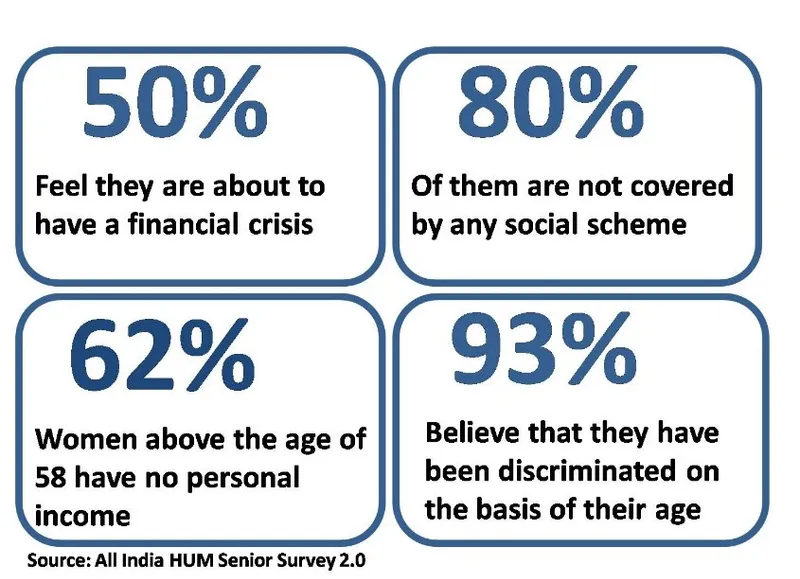Why it’s imperative that corporates tap the ‘Old Gold’ mine
As the number of elders keen to return to work rises, corporates need to draw up specific hiring plans to tap the vast experience and knowledge that senior citizens bring to the table.

Ageism: Prejudice or discrimination on the grounds of a person's age
A lot of us may not have faced ageism till now. After all, India is a young country with 65 percent of the population below 35 years of age. But we are going to face it in another 10-20 years unless we do something about it right now.
R K Vij, a 79-year-young electrical engineer and the founding partner of Hum Communities, is very optimistic. He says, “A movement to end ageism is underway. I am part of it and hope you will join me.” Let’s hope he is proven right.
Unfortunately, the statistics for about 14 crore senior citizens in India (citizens above 60 years of age) present a very grim story.

India, which is known for revering its elders, has failed its elders as a society. One of the solutions is to help elders get back to work and help them regain their respect. This may sound a very difficult goal in a country where most barbs are being exchanged on increasing unemployment among youth.
Who, if at all, is worried about jobs for senior citizens?
Since there is a defined problem with a big market size, we finally have a few startups chasing it. I spoke to a couple of founders and more. According to them, more and more senior citizens want to come back to work. They claim to have 40x-50x active resumes of senior citizens, compared to the number of jobs that they have on their portals. Apart from this, most leading job portals have a jobs section for senior citizens.
But we, as a country, don’t know how to bring back many more senior citizens to work and use their immense experience to our benefit. While some corporates like GE now have a specific hiring plan for retired defence personnel and some NGOs employ only senior citizens, we are still trying to understand how to build inclusive workplaces.
What works for them and what doesn’t? What should the workplace have to retain senior citizens? How can we align the priorities of senior citizens and corporates? How do we manage the generation gap between Generation B and Generation Z at workplaces?
Hum Communities is collaborating with government institutes to find answers to these questions. We expect to get some insights in the next 12-18 months. During our discussions with a leading NGO in this space, their Bangalore head commented that there were two key challenges when it comes to seniors coming back to work. The first is compensation. Some senior citizens who have been in professional jobs before don’t like if they are offered a significantly lower pay or designation by corporates than their last jobs. Secondly, many senior citizens become uncomfortable when a colleague, often 30 years younger, calls them by their first name. They take some time adjusting to the new-age work environment, but any dropout at this stage increases the number of naysayers in the organisation.
We can categorise senior citizens who are return to work into two categories – the first are those who need to work because of financial issues, don’t have stable income, have an unwell spouse or lack of family support. The second type are the ones who want to work to remain active and engaged. An interesting aspect is that the most critical criteria for senior citizens to look for a job is that work brings respect. So while it seems that money is the primary motivator for youth, self-esteem becomes the primary motivator when we age. Seniors have moved up the Maslow’s hierarchy for sure.
“When I used to go to work, my breakfast was on time and lunch box would be ready by 8.30 am. The day I retired, my breakfast would not be on the table before 10 am. Rightly or wrongly, I had become a lesser priority for my family. I can fully understand the situation, but I did not like it. So I decided to come back to work.” – A “back-to-work” senior citizen.
Some of them work to avoid sheer boredom. Research shows that delayed retirement helps in seniors being physically active, socially connected, and mentally challenged.
Kritarth Malhotra, a 24-year-old electrical engineer and the founding partner of Hum Communities, says: “We are trying to create job options according to the senior citizens. They want flexibility and most of the times they don’t like 9-5 jobs.” They are now working with corporates, SMEs and startups across India to create four types of opportunities – Entrepreneurship (business using WhatsApp), part time, work from home, and consulting/ project-based, in addition to standard 9-5 jobs. And these choices and flexibility seem to be attracting senior citizens.
There are many advantages that corporates and startups see with senior citizens. They know what needs to be done, they don’t need to be trained, they can navigate and build relationships, and attrition levels after the initial hiccups are low.
Kamalesh Nuthi, CoFounder, notretired.in believes that there are jobs where corporates are specifically looking for senior citizens. He gave an example, where a large conglomerate doing a metro project hired 20 retired police officers to ensure that liasioning with local police stations during traffic disruptions etc remains smooth. Liasioning emerges as an option of choice where corporates want the patience, humility, and relationship network that comes with age.
Similarly, a company that purchases forest produce from the forest department hired retired forest officers. So while we may think that senior citizens are being relegated to the backend, the reality is the opposite. The best use of their vast experience seems to be in front-end dealings like liasioning, consulting in niche segments, or for specific issues like taxation, audit, financial controls etc. He has also seen that there are minimal compensation differentials for senior citizens in such roles where they are handpicked for their specific knowledge and experience.
While corporates are making this effort, Elders.fit, an elder safety and eldercare startup, believes that corporates need to add safety and comfort features in their offices, in the same way they have now built creches for working mothers. And all of this has to be carefully done without hampering the inclusivity of the workspace. Elders.fit also believes that not enough sensitisation is being done by corporates to help their younger staff appreciate the value of experience of senior staff members.
But as we understand, only 5-10 percent of the senior citizens who have actively sought a job have been able to get one. As many as 39 out of 40 will not get what they want. Most of the times they don’t even know that there are web portals that focus solely on helping senior citizens get a job. They eventually drop out after the initial spurt of enthusiasm and settle down into a retired lifestyle.

Kritarth again points out that its easier for corporates to evaluate and value the experience of senior citizens with formal professional experience unlike those with the informal work experience. Some senior citizens with informal work experience are also opting to upgrade their skill sets and make themselves relevant again. We bow to their spirit!
There are many options that present themselves to senior citizens with non-formal experience and qualifications today. These include tuitions, volunteer work, counselling, and content moderation. And finally we came across a grandmother with Parkinson’s, who is spending an hour with her grandson’s friends talking about stories from the Ramayana and Mahabharata during the summer months.
We need to prepare senior citizens for the evolving job environment, which will be different from their previous experience. As per various stakeholders, senior citizens are very enthusiastic about learning more about working in a technology intensive environment and with millennials.
However, Kamalesh Nuthi of notretired.in rues that he has not got a single formal mandate to hire senior citizens from any corporate and that most of their placements are dependent on proactive follow-ups.
The onus right now is on corporates to understand and use the “old gold” mine that they are sitting on. A lot of “future” employers are reading this. We sincerely hope that they will open up their hearts and provide a fair chance to senior citizens.
This article has been contributed by Elders.fit, an elder safety and care startup.
(Disclaimer: The views and opinions expressed in this article are those of the author and do not necessarily reflect the views of YourStory.)







